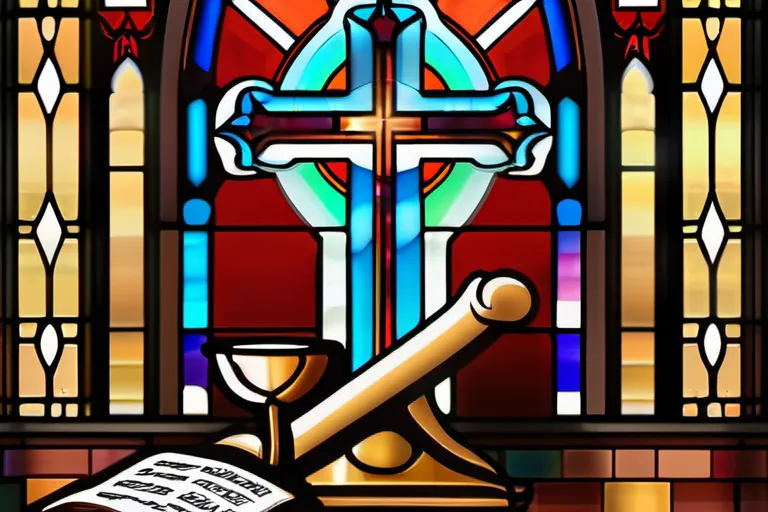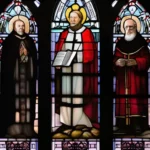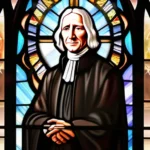Explore the core tenets, history, and practices of the Episcopal Church.
The Episcopal Church is a rich and vibrant denomination within Christianity. In this article, we delve into its beliefs, history, and unique practices that set it apart from other Christian traditions.
The History of the Episcopal Church
The Episcopal Church has its roots planted firmly in the rich soil of Western Christianity, but its journey to America is a tale of both continuity and change. How did it all begin? Let’s delve into the history that shaped this church, from its origins in the Church of England to its establishment in North America.
Imagine the Church of England as a vast garden, with centuries-old traditions and practices flourishing within its walls. The English Reformation, initiated by King Henry VIII, was like a fierce storm that uprooted many established norms, leading to the formation of the Church of England. It retained much of the Anglican tradition while making significant changes to align more closely with Protestant beliefs.
The Episcopal Church in America emerged as a daughter church from the mother church in England. Just like a child carries some genetic traits from its parent, the Episcopal Church inherited many aspects of the Church of England, including its liturgical traditions and the Book of Common Prayer. However, it also embraced American values, adapting to local customs while maintaining its core beliefs.
During the colonial era, the Episcopal Church in the United States of America faced numerous challenges, from political struggles to social issues. It was a period marked by both unity and diversity, as different groups sought to define their faith within the broader American context. The church’s response to these pressures often resembled navigating through treacherous waters, where one wrong move could sink its mission.
The establishment of the Episcopal Church in America wasn’t just about geographical expansion; it was a voyage of identity formation. It had to balance its ties with England while asserting its unique American character. This balancing act shaped not only the church’s practices but also its theological stance, ensuring that it remains a vibrant and evolving institution in the ever-changing landscape of Christianity.
Episcopalian Beliefs: The Nicene Creed
Let’s delve into the heart of Episcopal belief through the lens of the Nicene Creed. This ancient statement, like a compass pointing towards the core, guides us to understand what it means to be an Episcopalian. The Nicene Creed isn’t just a series of statements; it’s a living testament that echoes across centuries, linking contemporary Episcopalians with their Christian forebears.
Imagine the Creed as a tree, its roots deeply embedded in history and its branches stretching out towards the present day. When we recite this creed during services, we are not just repeating words but engaging in a profound act of spiritual continuity. Each word, like a node on the tree’s trunk, is significant, reflecting the shared beliefs that bind us together.
What does it mean to affirm the Trinity? This belief in one God in three persons—Father, Son, and Holy Spirit—is central to Episcopal faith. It’s as if we are saying, “We believe in the mystery of God, who is both singular and multifaceted.” The Nicene Creed encapsulates this complex truth in simple language, inviting us to ponder the divine nature.
Furthermore, Aleinu lishamlanu, the phrase meaning ‘for our sake alone,’ is a powerful reminder that God’s love extends beyond humanity. This underscores the Episcopal belief in God’s inclusive and universal grace. It’s like saying, “God cares not only for us but for all of creation.” This emphasis on inclusivity reflects the Church’s commitment to social justice and equality.
The Creed also affirms our belief in the resurrection of the body and life everlasting. This is more than a statement about the afterlife; it’s a promise that eternal life is not just an abstract concept but something tangible, something we can aspire to now. It’s like saying, “We believe in hope—hope that our lives have meaning beyond this world.”
In essence, when Episcopalians recite the Nicene Creed, they are reaffirming their commitment to a faith that is both ancient and ever-relevant. Through these words, we find ourselves connected to a vast network of believers past and present, united by shared beliefs and the common quest for understanding the divine.
The Role of Scripture and Tradition
The Episcopal Church, like many Christian denominations, grapples with the delicate balance between scripture and tradition. How does it decide which to follow when they seem at odds? The church teaches that both are essential, much like a ship needs both anchors and rudder for safe navigation. Scripture serves as the moral compass, guiding us with the clear light of God’s word. Yet, tradition acts as the experienced sailor who understands how to weather storms and navigate uncharted waters.
Imagine scripture as the Bible, the written Word of God, a timeless treasure that remains unchanged. It is like a map filled with divine instructions and promises. But what happens when circumstances change? How do we apply these ancient words to modern challenges? This is where tradition steps in. The Episcopal Church looks at its rich history, the wisdom passed down through generations, and the collective experience of faithful people over centuries.
Consider how the church handles contentious issues like social justice or environmental stewardship. Often, it turns to both scripture and tradition for guidance. For instance, when addressing climate change, scripture reminds us that God created the earth and calls us to care for it (Genesis 2:15). Meanwhile, tradition provides examples of how earlier generations have addressed similar challenges, offering practical wisdom and models of faithfulness.
The Episcopal Church finds its voice by listening deeply to both sources. It’s a conversation between the ancient and the modern, between what is written in the Bible and what has been learned through experience. This balance ensures that the church remains rooted in tradition while also adapting to the needs of today’s world. In this way, scripture and tradition work together like a symphony, each part contributing its unique voice to create harmony.
The Sacraments: A Central Focus
The seven sacraments are like a map, guiding Episcopalians on their spiritual journey through life’s various landscapes. Each sacrament is a tangible expression of God’s presence and action in the world, much like milestones marking significant points along a road trip. What exactly do these sacraments entail? The Episcopalian Church recognizes Baptism, Confirmation, Eucharist (Communion), Penance (Reconciliation), Anointing of the Sick, Holy Orders, and Matrimony as central to their faith.
Imagine Baptism as a key moment when we are washed clean and welcomed into God’s family. It’s not just about cleansing water; it’s about a fresh start in Christ. This sacrament is often celebrated with infants but can also be experienced by adults seeking spiritual rebirth.
Confirmation, on the other hand, is like stepping up to become an active member of that family. It’s a time for young people (and adults) to reaffirm their baptismal vows and take greater responsibility in their faith journey. This sacrament empowers individuals with a deeper understanding of their Christian identity.
The Eucharist or Communion is the heart of worship, representing the body and blood of Christ given for us. It’s a communal meal that reminds us of Christ’s sacrifice on the cross and unites believers in a shared experience. Every time we partake, it’s like taking a bite into the very life of Jesus.
Penance, or Reconciliation, is another crucial sacrament where sinners can seek forgiveness and healing. It’s not about judgment but grace—like a lighthouse guiding lost ships back to safety. Through confession and absolution, one finds restoration and renewed hope in their relationship with God.
The Anointing of the Sick is like a soothing balm for the body and soul during times of illness or frailty. It’s a reminder that even in our weakest moments, we are still loved by God and cared for by the community of faith.
Holy Orders involve ordination into various levels of ministry within the church. This sacrament anoints those called to serve as deacons, priests, or bishops, equipping them with spiritual gifts for leadership and pastoral care.
Lastly, Matrimony is celebrated with a unique blend of joy and responsibility. It’s not just about two people joining together; it’s about their commitment to love and serve each other in God’s name, mirroring the divine relationship between Christ and his church.
The sacraments are not merely rituals but profound expressions of faith that offer comfort, guidance, and transformation throughout life’s varied terrain. They are the tangible threads that weave together the fabric of Episcopal life, making it a rich tapestry of devotion and community.
Episcopalian Worship: The Book of Common Prayer
The Book of Common Prayer holds a special place in Episcopalian worship, much like a map guides travelers through unfamiliar terrain. It serves as a foundation that binds Episcopalians together, providing a shared language and structure for their devotional life. Have you ever wondered how such a book can have such a profound impact on daily practices?
This holy book is more than just a collection of prayers; it’s the heart of Episcopal worship. Each Sunday service, from the opening prayer to the closing benediction, follows a script that has stood the test of time. This consistency creates a sense of stability and continuity, allowing worshippers to find comfort in familiar surroundings while exploring new spiritual depths.
The prayers within are designed to be both personal and communal, bridging individual spirituality with collective faith. They offer guidance through life’s challenges, reminding believers that they are not alone in their struggles. The Book of Common Prayer serves as a bridge between the sacred and the secular, making spiritual matters accessible and relevant in everyday life.
Moreover, this book is more than just a religious text; it’s a living document that has evolved over centuries. Episcopalians have contributed their own reflections and revisions, ensuring that the Book of Common Prayer remains a dynamic tool for faith expression. It invites individuals to participate in shaping their spiritual journey, fostering a sense of community and shared purpose.
As you delve into its pages, you might find yourself questioning your own beliefs or pondering deeper meanings. The Book of Common Prayer is not just read but lived—its words become part of the fabric of Episcopalians’ lives, shaping their understanding of God and their place in the world. It’s a testament to how tradition can coexist with innovation, creating a rich tapestry of faith that endures through generations.
The Episcopal Church Today: A Global Community
How does one describe the Episcopal Church today, especially when it has become a global community with roots dating back to 1789? Is it merely a religious institution, or is there more to its identity than meets the eye?
The Episcopal Church stands as a beacon of diversity and unity in our interconnected world. From the United States to Africa, Asia, and beyond, it spans continents and cultures. Its mission is not just local but global—reaching out to people who might never step foot inside an American church.
Imagine the Episcopal Church as a vast tree with branches reaching far and wide. Each branch represents a different congregation or diocese, each unique yet connected by the same spiritual roots. This tree has grown strong over centuries, weathering storms of change and adversity. It thrives because of its commitment to inclusivity and equality.
What makes the Episcopal Church truly special is its approach to faith. It blends traditional Anglican teachings with contemporary values. Can you imagine walking through a church where ancient rituals coexist harmoniously with modern social justice movements? That’s exactly what one might experience in many Episcopal churches today.
The global presence of the Episcopal Church also lies in its active involvement in interfaith dialogues and humanitarian efforts. How can we ignore the impact that these churches have had on communities, offering aid during crises and promoting peace wherever they go?
As we look at the modern-day Episcopal Church, it’s clear that it is not just a place of worship but a force for change. It embodies the spirit of adaptability and openness to new ideas. In a world that often feels divided, the Episcopal Church serves as a model of unity in diversity.
So, how do we navigate this complex yet beautiful landscape? By engaging with its rich history, understanding its beliefs, and recognizing the impact it has on people’s lives across the globe. The Episcopal Church today is more than ever an integral part of our shared human experience.
Conclusion
 By understanding the Episcopal Church’s beliefs and practices, you can appreciate its rich heritage and find a deeper connection with your own faith.
By understanding the Episcopal Church’s beliefs and practices, you can appreciate its rich heritage and find a deeper connection with your own faith.











